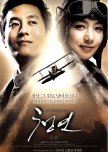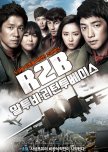Recent Discussions
-
 Last watched documentary series or movie?12 minutes ago
Last watched documentary series or movie?12 minutes ago -
Edits/Clips to watch while we wait for new episodes12 minutes ago
-
** Moon BAR + Starlight KTV + Moon SPA **21 minutes ago
-
 Am I the oldest fan girl?1 hour ago
Am I the oldest fan girl?1 hour ago -
 !! Thoughts For the Day !!1 hour ago
!! Thoughts For the Day !!1 hour ago


In June 1945 (Showa 20), Yamauchi Fusako goes alone to Manchuria where her husband, Setsuo, a second lieutenant of the Kwantung Army, is based. At that time, 200,000 Japanese had settled in Manchuria, a Japanese occupied territory, as settler communities. Fujita Hideo’s family worked hard to clear the wilderness, but the Soviets are lying in wait for an invasion of Manchuria from the North. Fusako is safely reunited with her husband at the headquarters of the Kwantung Army’s Fifth Training Squadron in Manchuria’s Dahushan. Setsuo also takes good care of his beloved wife, but his position is an instructor to the young soldiers who will eventually carry out suicide attacks. He wonders if he should have summoned her and speaks of these mixed feelings to his commanding officer, Michiba Kazuo, a first lieutenant. Michiba is concerned about Setsuo’s attempts to cherish his wife before the coming showdown on homeland. Fusako learns about life in Manchuria from Michiba’s wife, Etsu. In comparison to the interior, it not only had abundant food such as vegetables and rice, but also no air raids. Fusako’s welcome party and a celebratory party for an engaged couple, Setsuo’s colleague, Yuasa Tetsuo, and Inoue Hana, is held at night. Nishimura Tsuyoshi, Koguma Isamu, Kinoshita Tatsuo and other instructors drink together and the young soldiers simply stuff themselves with the food of Fusako and others. Fusako is happy to live together with Setsuo for the first time since they married that she seemingly forgets about the war. However, the village near the border where Fujita’s settler community lives, is finally invaded by the Soviet Army. They have to abandon the fields that they had struggled to cultivate and seek refuge in Dahushan. Then, the Kwantung Army also gives orders for sorties at last. Fusako’s peaceful days are about to quickly collapse.


Based on the true story Park Kyung Won, one of the first Korean female pilots. Park Kyung Won dreamed of flying since she was a little kid. To achieve her dream of becoming a pilot, Kyung Won, at the age of 26, traveled to Japan and enrolled in an aviation school. While studying at the aviation school, she supported herself by driving a taxi. One day, Kyung Won picks up a male passenger, who turns out to be a Korean exchange student Ji Hyeok. Ji Hyeok is attracted to her and what she was trying to accomplish. Although he begins to court Kyung Won, Ji Hyeok leaves to enlist in the army. A few years later, Kyung Won flies her first flight and becomes a pilot. Her accomplishment is well received Korea. Meanwhile, Kyung Won takes under her wings, fellow female Korean aviation student Jung Hee, who wants to follow in Kyung Won's footsteps. Also, Ji Hyuk is discharged from the army and is commissioned as a officer in a aviation school. Ji Hyuk and Kyung Won meet again and soon realize their feelings are as strong as ever. Eventually Kyung Won hopes to take part in a long-distance flight to her home country of South Korea ...


Based on the true story Park Kyung Won, one of the first Korean female pilots. Park Kyung Won dreamed of flying since she was a little kid. To achieve her dream of becoming a pilot, Kyung Won, at the age of 26, traveled to Japan and enrolled in an aviation school. While studying at the aviation school, she supported herself by driving a taxi. One day, Kyung Won picks up a male passenger, who turns out to be a Korean exchange student Ji Hyeok. Ji Hyeok is attracted to her and what she was trying to accomplish. Although he begins to court Kyung Won, Ji Hyeok leaves to enlist in the army. A few years later, Kyung Won flies her first flight and becomes a pilot. Her accomplishment is well received Korea. Meanwhile, Kyung Won takes under her wings, fellow female Korean aviation student Jung Hee, who wants to follow in Kyung Won's footsteps. Also, Ji Hyuk is discharged from the army and is commissioned as a officer in a aviation school. Ji Hyuk and Kyung Won meet again and soon realize their feelings are as strong as ever. Eventually Kyung Won hopes to take part in a long-distance flight to her home country of South Korea ...


~~ Based on the true story of a highly decorated Lieutenant Colonel in the Taiwan Air Force — Lee Cheng Liang, and his selfless dedication to his visually impaired wife.


In June 1945 (Showa 20), Yamauchi Fusako goes alone to Manchuria where her husband, Setsuo, a second lieutenant of the Kwantung Army, is based. At that time, 200,000 Japanese had settled in Manchuria, a Japanese occupied territory, as settler communities. Fujita Hideo’s family worked hard to clear the wilderness, but the Soviets are lying in wait for an invasion of Manchuria from the North. Fusako is safely reunited with her husband at the headquarters of the Kwantung Army’s Fifth Training Squadron in Manchuria’s Dahushan. Setsuo also takes good care of his beloved wife, but his position is an instructor to the young soldiers who will eventually carry out suicide attacks. He wonders if he should have summoned her and speaks of these mixed feelings to his commanding officer, Michiba Kazuo, a first lieutenant. Michiba is concerned about Setsuo’s attempts to cherish his wife before the coming showdown on homeland. Fusako learns about life in Manchuria from Michiba’s wife, Etsu. In comparison to the interior, it not only had abundant food such as vegetables and rice, but also no air raids. Fusako’s welcome party and a celebratory party for an engaged couple, Setsuo’s colleague, Yuasa Tetsuo, and Inoue Hana, is held at night. Nishimura Tsuyoshi, Koguma Isamu, Kinoshita Tatsuo and other instructors drink together and the young soldiers simply stuff themselves with the food of Fusako and others. Fusako is happy to live together with Setsuo for the first time since they married that she seemingly forgets about the war. However, the village near the border where Fujita’s settler community lives, is finally invaded by the Soviet Army. They have to abandon the fields that they had struggled to cultivate and seek refuge in Dahushan. Then, the Kwantung Army also gives orders for sorties at last. Fusako’s peaceful days are about to quickly collapse.


Based on the true story Park Kyung Won, one of the first Korean female pilots. Park Kyung Won dreamed of flying since she was a little kid. To achieve her dream of becoming a pilot, Kyung Won, at the age of 26, traveled to Japan and enrolled in an aviation school. While studying at the aviation school, she supported herself by driving a taxi. One day, Kyung Won picks up a male passenger, who turns out to be a Korean exchange student Ji Hyeok. Ji Hyeok is attracted to her and what she was trying to accomplish. Although he begins to court Kyung Won, Ji Hyeok leaves to enlist in the army. A few years later, Kyung Won flies her first flight and becomes a pilot. Her accomplishment is well received Korea. Meanwhile, Kyung Won takes under her wings, fellow female Korean aviation student Jung Hee, who wants to follow in Kyung Won's footsteps. Also, Ji Hyuk is discharged from the army and is commissioned as a officer in a aviation school. Ji Hyuk and Kyung Won meet again and soon realize their feelings are as strong as ever. Eventually Kyung Won hopes to take part in a long-distance flight to her home country of South Korea ...


~~ Based on the true story of a highly decorated Lieutenant Colonel in the Taiwan Air Force — Lee Cheng Liang, and his selfless dedication to his visually impaired wife.


~~ Based on the true story of a highly decorated Lieutenant Colonel in the Taiwan Air Force — Lee Cheng Liang, and his selfless dedication to his visually impaired wife.


In June 1945 (Showa 20), Yamauchi Fusako goes alone to Manchuria where her husband, Setsuo, a second lieutenant of the Kwantung Army, is based. At that time, 200,000 Japanese had settled in Manchuria, a Japanese occupied territory, as settler communities. Fujita Hideo’s family worked hard to clear the wilderness, but the Soviets are lying in wait for an invasion of Manchuria from the North. Fusako is safely reunited with her husband at the headquarters of the Kwantung Army’s Fifth Training Squadron in Manchuria’s Dahushan. Setsuo also takes good care of his beloved wife, but his position is an instructor to the young soldiers who will eventually carry out suicide attacks. He wonders if he should have summoned her and speaks of these mixed feelings to his commanding officer, Michiba Kazuo, a first lieutenant. Michiba is concerned about Setsuo’s attempts to cherish his wife before the coming showdown on homeland. Fusako learns about life in Manchuria from Michiba’s wife, Etsu. In comparison to the interior, it not only had abundant food such as vegetables and rice, but also no air raids. Fusako’s welcome party and a celebratory party for an engaged couple, Setsuo’s colleague, Yuasa Tetsuo, and Inoue Hana, is held at night. Nishimura Tsuyoshi, Koguma Isamu, Kinoshita Tatsuo and other instructors drink together and the young soldiers simply stuff themselves with the food of Fusako and others. Fusako is happy to live together with Setsuo for the first time since they married that she seemingly forgets about the war. However, the village near the border where Fujita’s settler community lives, is finally invaded by the Soviet Army. They have to abandon the fields that they had struggled to cultivate and seek refuge in Dahushan. Then, the Kwantung Army also gives orders for sorties at last. Fusako’s peaceful days are about to quickly collapse.


In June 1945 (Showa 20), Yamauchi Fusako goes alone to Manchuria where her husband, Setsuo, a second lieutenant of the Kwantung Army, is based. At that time, 200,000 Japanese had settled in Manchuria, a Japanese occupied territory, as settler communities. Fujita Hideo’s family worked hard to clear the wilderness, but the Soviets are lying in wait for an invasion of Manchuria from the North. Fusako is safely reunited with her husband at the headquarters of the Kwantung Army’s Fifth Training Squadron in Manchuria’s Dahushan. Setsuo also takes good care of his beloved wife, but his position is an instructor to the young soldiers who will eventually carry out suicide attacks. He wonders if he should have summoned her and speaks of these mixed feelings to his commanding officer, Michiba Kazuo, a first lieutenant. Michiba is concerned about Setsuo’s attempts to cherish his wife before the coming showdown on homeland. Fusako learns about life in Manchuria from Michiba’s wife, Etsu. In comparison to the interior, it not only had abundant food such as vegetables and rice, but also no air raids. Fusako’s welcome party and a celebratory party for an engaged couple, Setsuo’s colleague, Yuasa Tetsuo, and Inoue Hana, is held at night. Nishimura Tsuyoshi, Koguma Isamu, Kinoshita Tatsuo and other instructors drink together and the young soldiers simply stuff themselves with the food of Fusako and others. Fusako is happy to live together with Setsuo for the first time since they married that she seemingly forgets about the war. However, the village near the border where Fujita’s settler community lives, is finally invaded by the Soviet Army. They have to abandon the fields that they had struggled to cultivate and seek refuge in Dahushan. Then, the Kwantung Army also gives orders for sorties at last. Fusako’s peaceful days are about to quickly collapse.


In June 1945 (Showa 20), Yamauchi Fusako goes alone to Manchuria where her husband, Setsuo, a second lieutenant of the Kwantung Army, is based. At that time, 200,000 Japanese had settled in Manchuria, a Japanese occupied territory, as settler communities. Fujita Hideo’s family worked hard to clear the wilderness, but the Soviets are lying in wait for an invasion of Manchuria from the North. Fusako is safely reunited with her husband at the headquarters of the Kwantung Army’s Fifth Training Squadron in Manchuria’s Dahushan. Setsuo also takes good care of his beloved wife, but his position is an instructor to the young soldiers who will eventually carry out suicide attacks. He wonders if he should have summoned her and speaks of these mixed feelings to his commanding officer, Michiba Kazuo, a first lieutenant. Michiba is concerned about Setsuo’s attempts to cherish his wife before the coming showdown on homeland. Fusako learns about life in Manchuria from Michiba’s wife, Etsu. In comparison to the interior, it not only had abundant food such as vegetables and rice, but also no air raids. Fusako’s welcome party and a celebratory party for an engaged couple, Setsuo’s colleague, Yuasa Tetsuo, and Inoue Hana, is held at night. Nishimura Tsuyoshi, Koguma Isamu, Kinoshita Tatsuo and other instructors drink together and the young soldiers simply stuff themselves with the food of Fusako and others. Fusako is happy to live together with Setsuo for the first time since they married that she seemingly forgets about the war. However, the village near the border where Fujita’s settler community lives, is finally invaded by the Soviet Army. They have to abandon the fields that they had struggled to cultivate and seek refuge in Dahushan. Then, the Kwantung Army also gives orders for sorties at last. Fusako’s peaceful days are about to quickly collapse.


In June 1945 (Showa 20), Yamauchi Fusako goes alone to Manchuria where her husband, Setsuo, a second lieutenant of the Kwantung Army, is based. At that time, 200,000 Japanese had settled in Manchuria, a Japanese occupied territory, as settler communities. Fujita Hideo’s family worked hard to clear the wilderness, but the Soviets are lying in wait for an invasion of Manchuria from the North. Fusako is safely reunited with her husband at the headquarters of the Kwantung Army’s Fifth Training Squadron in Manchuria’s Dahushan. Setsuo also takes good care of his beloved wife, but his position is an instructor to the young soldiers who will eventually carry out suicide attacks. He wonders if he should have summoned her and speaks of these mixed feelings to his commanding officer, Michiba Kazuo, a first lieutenant. Michiba is concerned about Setsuo’s attempts to cherish his wife before the coming showdown on homeland. Fusako learns about life in Manchuria from Michiba’s wife, Etsu. In comparison to the interior, it not only had abundant food such as vegetables and rice, but also no air raids. Fusako’s welcome party and a celebratory party for an engaged couple, Setsuo’s colleague, Yuasa Tetsuo, and Inoue Hana, is held at night. Nishimura Tsuyoshi, Koguma Isamu, Kinoshita Tatsuo and other instructors drink together and the young soldiers simply stuff themselves with the food of Fusako and others. Fusako is happy to live together with Setsuo for the first time since they married that she seemingly forgets about the war. However, the village near the border where Fujita’s settler community lives, is finally invaded by the Soviet Army. They have to abandon the fields that they had struggled to cultivate and seek refuge in Dahushan. Then, the Kwantung Army also gives orders for sorties at last. Fusako’s peaceful days are about to quickly collapse.


In June 1945 (Showa 20), Yamauchi Fusako goes alone to Manchuria where her husband, Setsuo, a second lieutenant of the Kwantung Army, is based. At that time, 200,000 Japanese had settled in Manchuria, a Japanese occupied territory, as settler communities. Fujita Hideo’s family worked hard to clear the wilderness, but the Soviets are lying in wait for an invasion of Manchuria from the North. Fusako is safely reunited with her husband at the headquarters of the Kwantung Army’s Fifth Training Squadron in Manchuria’s Dahushan. Setsuo also takes good care of his beloved wife, but his position is an instructor to the young soldiers who will eventually carry out suicide attacks. He wonders if he should have summoned her and speaks of these mixed feelings to his commanding officer, Michiba Kazuo, a first lieutenant. Michiba is concerned about Setsuo’s attempts to cherish his wife before the coming showdown on homeland. Fusako learns about life in Manchuria from Michiba’s wife, Etsu. In comparison to the interior, it not only had abundant food such as vegetables and rice, but also no air raids. Fusako’s welcome party and a celebratory party for an engaged couple, Setsuo’s colleague, Yuasa Tetsuo, and Inoue Hana, is held at night. Nishimura Tsuyoshi, Koguma Isamu, Kinoshita Tatsuo and other instructors drink together and the young soldiers simply stuff themselves with the food of Fusako and others. Fusako is happy to live together with Setsuo for the first time since they married that she seemingly forgets about the war. However, the village near the border where Fujita’s settler community lives, is finally invaded by the Soviet Army. They have to abandon the fields that they had struggled to cultivate and seek refuge in Dahushan. Then, the Kwantung Army also gives orders for sorties at last. Fusako’s peaceful days are about to quickly collapse.


In June 1945 (Showa 20), Yamauchi Fusako goes alone to Manchuria where her husband, Setsuo, a second lieutenant of the Kwantung Army, is based. At that time, 200,000 Japanese had settled in Manchuria, a Japanese occupied territory, as settler communities. Fujita Hideo’s family worked hard to clear the wilderness, but the Soviets are lying in wait for an invasion of Manchuria from the North. Fusako is safely reunited with her husband at the headquarters of the Kwantung Army’s Fifth Training Squadron in Manchuria’s Dahushan. Setsuo also takes good care of his beloved wife, but his position is an instructor to the young soldiers who will eventually carry out suicide attacks. He wonders if he should have summoned her and speaks of these mixed feelings to his commanding officer, Michiba Kazuo, a first lieutenant. Michiba is concerned about Setsuo’s attempts to cherish his wife before the coming showdown on homeland. Fusako learns about life in Manchuria from Michiba’s wife, Etsu. In comparison to the interior, it not only had abundant food such as vegetables and rice, but also no air raids. Fusako’s welcome party and a celebratory party for an engaged couple, Setsuo’s colleague, Yuasa Tetsuo, and Inoue Hana, is held at night. Nishimura Tsuyoshi, Koguma Isamu, Kinoshita Tatsuo and other instructors drink together and the young soldiers simply stuff themselves with the food of Fusako and others. Fusako is happy to live together with Setsuo for the first time since they married that she seemingly forgets about the war. However, the village near the border where Fujita’s settler community lives, is finally invaded by the Soviet Army. They have to abandon the fields that they had struggled to cultivate and seek refuge in Dahushan. Then, the Kwantung Army also gives orders for sorties at last. Fusako’s peaceful days are about to quickly collapse.


In June 1945 (Showa 20), Yamauchi Fusako goes alone to Manchuria where her husband, Setsuo, a second lieutenant of the Kwantung Army, is based. At that time, 200,000 Japanese had settled in Manchuria, a Japanese occupied territory, as settler communities. Fujita Hideo’s family worked hard to clear the wilderness, but the Soviets are lying in wait for an invasion of Manchuria from the North. Fusako is safely reunited with her husband at the headquarters of the Kwantung Army’s Fifth Training Squadron in Manchuria’s Dahushan. Setsuo also takes good care of his beloved wife, but his position is an instructor to the young soldiers who will eventually carry out suicide attacks. He wonders if he should have summoned her and speaks of these mixed feelings to his commanding officer, Michiba Kazuo, a first lieutenant. Michiba is concerned about Setsuo’s attempts to cherish his wife before the coming showdown on homeland. Fusako learns about life in Manchuria from Michiba’s wife, Etsu. In comparison to the interior, it not only had abundant food such as vegetables and rice, but also no air raids. Fusako’s welcome party and a celebratory party for an engaged couple, Setsuo’s colleague, Yuasa Tetsuo, and Inoue Hana, is held at night. Nishimura Tsuyoshi, Koguma Isamu, Kinoshita Tatsuo and other instructors drink together and the young soldiers simply stuff themselves with the food of Fusako and others. Fusako is happy to live together with Setsuo for the first time since they married that she seemingly forgets about the war. However, the village near the border where Fujita’s settler community lives, is finally invaded by the Soviet Army. They have to abandon the fields that they had struggled to cultivate and seek refuge in Dahushan. Then, the Kwantung Army also gives orders for sorties at last. Fusako’s peaceful days are about to quickly collapse.


